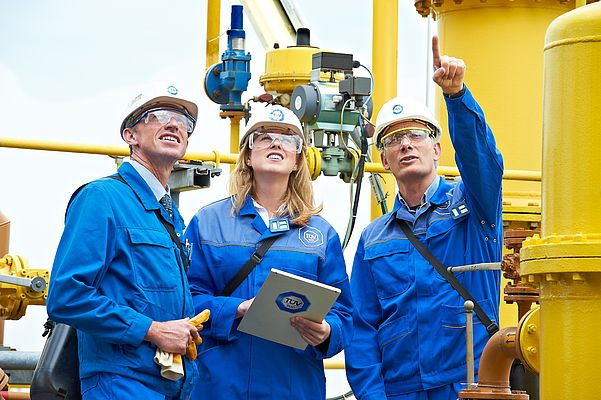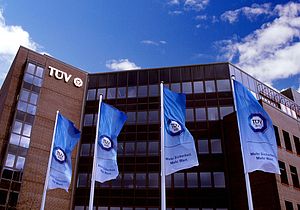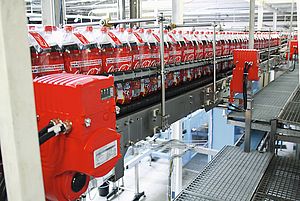Energy data management systems (EDMS) offer in-depth insights into energy demand. Selecting the right solution that meets the requirements of the chemical and the process industries and complies with legal standards is of critical importance. The "Certified Energy Data Management System" standard defined by TÜV SÜD Industrie Service provides certainty.
After raw materials, energy is the second largest cost factor in the process industry. Given that, price trends and availability of resources, rising energy costs and increasingly strict legal regulations transform efficient energy use into a critical competitive factor. Companies must have an economic and ecological interest in continuously improving their energy efficiency on the basis of energy management systems (EnMS). This benefits company image, cost management and competitiveness and is good for the climate and our environment. From 2013 onwards, additional incentives will be offered in terms of tax reliefs for electricity and energy and the special equalisation provision within the EEG for easing the burden on energy-intensive companies that can furnish proof of a certified energy management system (EnMS) in accordance with the EN ISO 50001 standard. These reliefs add up to around EUR 290,000 per year for an energy demand of 10 GWh.
EN ISO 50001 is the first international EnMS standard that offers guidance for use, assisting both energy-intensive large-scale companies and small- and medium-sized enterprises in the chemical and process industries to establish and implement an energy management system. Systematic and integrated energy management systems build on successful organisational and information structures and intelligent energy data management systems that can be customised to a company's business needs. However, the anticipatory coordination of energy consumption and the successful realisation of possible improvements and savings require reliable data collection and analysis, as the quality of the data collected is crucial for future optimisation measures.
Wide selection of system solutions
At present, over one hundred different energy data management systems are available on the market, making it difficult to compare and choose the right system solution. Besides, not all products meet legal and other requirements defined for computer-aided monitoring and analysis of energy demand. The same applies to the quality of software and hardware components and the collection of measured data. In view of industry-specific requirements and the large number of possible interfaces that may have to be integrated, systems must also offer optional modifications and customising options.
Given that, TÜV SÜD Industrie Service not only tests hardware and software components but also checks sales processes and the user-friendliness of the systems. EDMS certification by TÜV SÜD is based on long-standing experience with the EN 16001 and EN ISO 50001 standards and its own standard developed on the basis of this experience. Based on test lists and checklists, TÜV SÜD assesses and evaluates the features and functions that are critical for system certification on the following four product levels: field, automation, management and service. Products that meet the ambitious requirements of the TÜV SÜD standard are awarded the TÜV SÜD certificate.
Clarifying three functional areas
Essentially, energy data management systems comprise three functional areas: the collection and checking of raw data from various sources; the recording, analysis and visualisation of individual and combined data histories and trends; and the preparation and delivery of reports and evaluations.
Consequently, a company's energy management system and the strategic alignment of its energy targets can only be as good as the underlying measurement and evaluation of the relevant data. Given that, the experts of TÜV SÜD Industrie Service regard the quality and quantity of the data generated and saved at field level as crucial criteria in EDMS certification, as they decide the quality of subsequent data processing and analysis. Standardised bus systems are essential to precise and complete data collection. They ensure interoperability with sensors and measurement systems from various suppliers, thus simplifying system expansion by allowing further points of measurement to be added.
A standardised bus system is also recommended at automation level to ensure the interoperability and compatibility of all components irrespective of their suppliers. To exclude data losses in the system in early phases of the process, the EDMS must offer reliable automatic recording and saving of all measured values as well as permanent and reliable data backup procedures. TÜV SÜD also verifies that the system uses high-performance data-storage devices, multi-functional data loggers, programmable controls and accurate date and time management.
The actual analysis of the collected data is carried out at the system's management level. In this context, the experts check a host of functions including the display of various load cycles within reasonable time scales, consideration of actual values, recognition of threshold and limit exceeding, and the system's initial data plausibility checks. Beyond that, the EDMS pros also check the options and quality of manual and mobile data input, the energy reports and performance indicators generated by the system and the mapping of energy consumption trends. On the management level, the specialists check functional aspects, but also the system's user-friendliness and the clarity of graphic displays. Like a HUD in a cockpit that provides information from which further measures can be deduced and decision making optimised, the results of data analysis and measures should be simple, displayed transparently and easy to communicate.
Finally, service level the certification experts review the support services offered by the software supplier and its sales partners, including seminar and training offers and regular software updates. Further important criteria include the quality and scope of the service levels offered, response times in case of malfunctions, mean-time-to-repair and whether the EDMS has already been implemented successfully at reference clients.
Energy efficiency – a factor in competition
Clients and companies are increasingly placing greater emphasis on the sustainability of their business partners and suppliers. By choosing an energy data management system certified by a third party, companies can be sure that the system offers the required performance, delivers precise data processing and fulfils the legal requirements and the criteria for tax reliefs.
By: Steffen Kügler, Energy Systems, TÜV SÜD Industrie Service
Energy Data Management Systems
Systematic efficiency: All energy data under control
- by TÜV Süd Industrie Service GmbH
- November 14, 2012
- 586 views




















